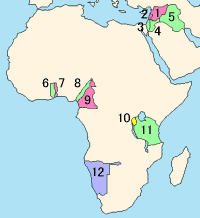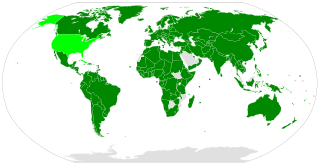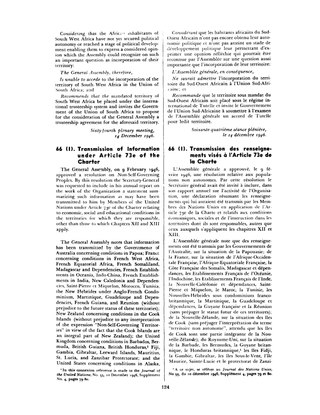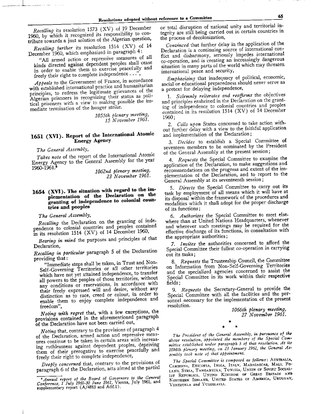
A League of Nations mandate represented a legal status under international law for specific territories following World War I, involving the transfer of control from one nation to another. These mandates served as legal documents establishing the internationally agreed terms for administering the territory on behalf of the League of Nations. Combining elements of both a treaty and a constitution, these mandates contained minority rights clauses that provided for the rights of petition and adjudication by the Permanent Court of International Justice.

Self-determination refers to a people's right to form its own political entity, and internal self-determination is the right to representative government with full suffrage. Self-determination is a cardinal principle in modern international law, binding, as such, on the United Nations as authoritative interpretation of the Charter's norms. As a principle of international law the right of self-determination recognized in the 1960s concerns the colonial context of territories' right to independence or another outcome of decolonization. The principle does not state how the decision is to be made, nor what the outcome should be, whether it be independence, federation, protection, some form of autonomy or full assimilation. The internationally recognized right of self-determination does not include a right to an independent state for every ethnic group within a former colonial territory. While there is ongoing discussion about the rights of minorities and indigenous people who are denied political participation in representative governments and consequently suffer systematic violations of human rights as a group, no right to secession is recognized under international law.

The United Nations Trusteeship Council is one of the six principal organs of the United Nations, established to help ensure that trust territories were administered in the best interests of their inhabitants and of international peace and security.

The Charter of the United Nations (UN) is the foundational treaty of the United Nations. It establishes the purposes, governing structure, and overall framework of the UN system, including its six principal organs: the Secretariat, the General Assembly, the Security Council, the Economic and Social Council, the International Court of Justice, and the Trusteeship Council.

The International Covenant on Civil and Political Rights (ICCPR) is a multilateral treaty that commits nations to respect the civil and political rights of individuals, including the right to life, freedom of religion, freedom of speech, freedom of assembly, electoral rights and rights to due process and a fair trial. It was adopted by United Nations General Assembly Resolution 2200A (XXI) on 16 December 1966 and entered into force on 23 March 1976 after its thirty-fifth ratification or accession. As of June 2022, the Covenant has 173 parties and six more signatories without ratification, most notably the People's Republic of China and Cuba; North Korea is the only state that has tried to withdraw.
A United Nations General Assembly resolution is a decision or declaration voted on by all member states of the United Nations in the General Assembly.

Gibraltar, a British Overseas Territory, located at the southern tip of the Iberian Peninsula, is the subject of a territorial claim by Spain. It was captured in 1704 during the War of the Spanish Succession (1701–1714). The Spanish Crown formally ceded the territory in perpetuity to the British Crown in 1713, under Article X of the Treaty of Utrecht. Spain later attempted to recapture the territory during the thirteenth siege (1727) and the Great Siege (1779–1783). British sovereignty over Gibraltar was confirmed in later treaties signed in Seville (1729) and the Treaty of Paris (1783).

The International Covenant on Economic, Social and Cultural Rights (ICESCR) is a multilateral treaty adopted by the United Nations General Assembly (GA) on 16 December 1966 through GA. Resolution 2200A (XXI), and came into force on 3 January 1976. It commits its parties to work toward the granting of economic, social, and cultural rights (ESCR) to all individuals including those living in Non-Self-Governing and Trust Territories. The rights include labour rights, the right to health, the right to education, and the right to an adequate standard of living. As of February 2024, the Covenant has 172 parties. A further four countries, including the United States, have signed but not ratified the Covenant.

Chapter XI of the United Nations Charter defines a non-self-governing territory (NSGT) as a territory "whose people have not yet attained a full measure of self-government". In practice, an NSGT is a territory deemed by the United Nations General Assembly (UNGA) to be "non-self-governing". Chapter XI of the UN Charter also includes a "Declaration on Non-Self-Governing Territories" that the interests of the occupants of dependent territories are paramount and requires member states of the United Nations in control of such territories to submit annual information reports concerning the development of those territories. Since 1946, the UNGA has maintained a list of non-self governing territories under member states' control. Since its inception, dozens of territories have been removed from the list, typically when they attained independence or internal self-government, while other territories have been added as new administering countries joined the United Nations or the General Assembly reassessed the status of certain territories.

The Southern Cameroons was the southern part of the British League of Nations mandate territory of the British Cameroons in West Africa. Since 1961, it has been part of the Republic of Cameroon, where it makes up the Northwest Region and Southwest Region. Since 1994, pressure groups in the territory claim there was no legal document in accordance to UNGA RES 1608(XV) paragraph 5, and are seeking to restore statehood and independence from the Republic. They renamed the British Southern Cameroons as Ambazonia.
The Declaration on the Granting of Independence to Colonial Countries and Peoples, also known as the United Nations General Assembly Resolution 1514, was a resolution of the United Nations General Assembly during its fifteenth session, that affirmed independence for countries and peoples under colonial rule.
Chapter XI of the United Nations Charter deals with non-self-governing territories.

The United Nations General Assembly Fourth Committee is one of six main committees of the United Nations General Assembly. It deals with a diverse set of political issues, including UN peacekeeping and peaceful uses of outer space. However, the issues of decolonization and the Middle East take up most of its time.

The Yogyakarta Principles is a document about human rights in the areas of sexual orientation and gender identity that was published as the outcome of an international meeting of human rights groups in Yogyakarta, Indonesia, in November 2006. The principles were supplemented and expanded in 2017 to include new grounds of gender expression and sex characteristics and a number of new principles. However, the Principles have never been accepted by the United Nations (UN) and the attempt to make gender identity and sexual orientation new categories of non-discrimination has been repeatedly rejected by the General Assembly, the UN Human Rights Council and other UN bodies.

The Manila Accord was signed on 31 July 1963 by the Federation of Malaya, the Republic of Indonesia and the Republic of the Philippines, after a meeting from 7 to 11 June 1963 in Manila.

The 1974 Yugoslav Constitution was the fourth and final constitution of the Socialist Federal Republic of Yugoslavia. It came into effect on 21 February 1974.
The Blue Water Thesis or Salt Water Thesis, was a limited decolonization approach arising from United Nations General Assembly Resolution 637, which linked self-determination with non-self-governing territories.

United Nations General Assembly Resolution 1654 of 27 November 1961, titled "The situation with regard to the implementation of the Declaration on the Granting of Independence to Colonial Countries and Peoples" was a resolution of the United Nations General Assembly during its sixteenth session. It reaffirmed the Declaration on the Granting of Independence to Colonial Countries and Peoples in Resolution 1514 (XV) of 14 December 1960.
The United Nations General Assembly Resolution 2625, "The Declaration on Principles of International Law concerning Friendly Relations and Co-operation among States" was adopted by the General Assembly on 24 October 1970, during a commemorative session to celebrate the twenty-fifth anniversary of the United Nations. The Declaration worked out the most authoritative and comprehensive formulation so far of the principle of self-determination.

The United Nations Special Committee on the Situation with Regard to the Implementation of the Declaration on the Granting of Independence to Colonial Countries and Peoples, or the Special Committee on Decolonization (C-24), is a committee of the United Nations General Assembly that was established in 1961 and is exclusively devoted to the issue of decolonization.












